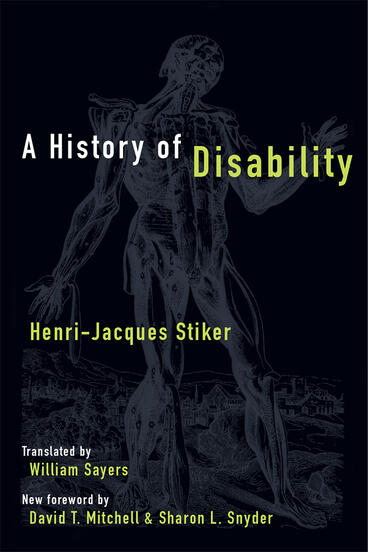A History of Disability
with a new foreword by David Mitchell and Sharon Snyder
A bold analysis of the evolution of Western attitudes toward disability
Description
The first book to attempt to provide a framework for analyzing disability through the ages, Henri-Jacques Stiker's now classic A History of Disability traces the history of western cultural responses to disability, from ancient times to the present. The sweep of the volume is broad; from a rereading and reinterpretation of the Oedipus myth to legislation regarding disability, Stiker proposes an analytical history that demonstrates how societies reveal themselves through their attitudes towards disability in unexpected ways. Through this history, Stiker examines a fundamental issue in contemporary Western discourse on disability: the cultural assumption that equality/sameness/similarity is always desired by those in society. He highlights the consequences of such a mindset, illustrating the intolerance of diversity and individualism that arises from placing such importance on equality. Working against this thinking, Stiker argues that difference is not only acceptable, but that it is desirable, and necessary.
This new edition of the classic volume features a new foreword by David T. Mitchell and Sharon L. Snyder that assesses the impact of Stiker’s history on Disability Studies and beyond, twenty years after the book’s translation into English. The book will be of interest to scholars of disability, historians, social scientists, cultural anthropologists, and those who are intrigued by the role that culture plays in the development of language and thought surrounding people with disabilities.
Henri-Jacques Stiker is director of research at Laboratoire "Identités, cultures, territoires" at Université Paris-Diderot, Paris 7, and is co-founder and editorial director of ALTER, European Journal of Disability Research. He is the author of Culture brisée, culture à naître; Corps infirmes et sociétés; Pour le débat démocratique, la question du handicap; Les fables peintes du corps abîmé, Les images de l’infirmité du XVIè au XXè siècle; Les métamorphoses du handicap de 1970 à nos jours, soi-même avec les autres; and Religions et handicap, interdit, péché, symbole, une analyse anthropologique.
Reviews
"A History of Disability should be read by everyone interested in any aspect of Disability Studies and every library should own a copy. The brilliant conceptualization of disability makes this an indispensable tool in Disability Studies."
—Disability Studies Quarterly
“[A]ll studies of disability, past or present, can strengthen their analysis by bringing in Stiker's critical perspectives concerning the idea of rehabilitation.”
—Scandinavian Journal of Disability Research
"Henri-Jacques Stiker's reflection on the exclusion of disabled bodies, the product of vast anthropological, historical, and social research, is a rigorous and passionate meditation. It ranges from the Oedipus myth through the Bible, the Gospels, Islam, mysticism, philosophy, and biology, all the way to current legislation . . . Stiker leads us to see people with disabilities as ourselves---not as machines but as explorers of the impossible."
—Julia Kristeva

